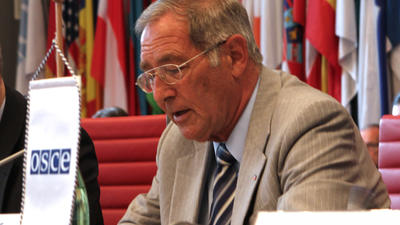-
Our work
-
Fields of work
- Arms control
- Border management
- Combating trafficking in human beings
- Conflict prevention and resolution
- Countering terrorism
- Cyber/ICT Security
- Democratization
- Economic activities
- Education
- Elections
- Environmental activities
- Gender equality
- Good governance
- Human rights
- Media freedom and development
- Migration
- National minority issues
- Policing
- Reform and co-operation in the security sector
- Roma and Sinti
- Rule of law
- Tolerance and non-discrimination
- Youth
- Field operations
- Projects
-
Meetings and conferences
- Summit meetings
- Review Conferences
- Ministerial Council meetings
- Plenary meetings of the Permanent Council
- Plenary Meetings of the Forum for Security Co-operation
- Security Review Conferences
- Annual Implementation Assessment Meetings
- Economic and Environmental Forum
- Economic and Environmental Dimension Implementation Meetings
- Human rights meetings
- Media conferences
- Cyber/ICT security conferences
- Conference of the Alliance against Trafficking in Persons
- Gender equality conferences
- Annual OSCE Mediterranean conferences
- Annual OSCE Asian conferences
- Partnerships
-
Fields of work
-
Countries
- All
-
Participating States
- Albania
- Andorra
- Armenia
- Austria
- Azerbaijan
- Belgium
- Belarus
- Bosnia and Herzegovina
- Bulgaria
- Canada
- Croatia
- Cyprus
- Czechia
- Denmark
- Estonia
- Finland
- France
- Georgia
- Germany
- Greece
- Holy See
- Hungary
- Iceland
- Ireland
- Italy
- Kazakhstan
- Kyrgyzstan
- Latvia
- Liechtenstein
- Lithuania
- Luxembourg
- Malta
- Moldova
- Monaco
- Mongolia
- Montenegro
- The Netherlands
- North Macedonia
- Norway
- Poland
- Portugal
- Romania
- Russian Federation
- San Marino
- Serbia
- Slovakia
- Slovenia
- Spain
- Sweden
- Switzerland – OSCE Chairpersonship 2026
- Tajikistan
- Türkiye
- Turkmenistan
- Ukraine
- United Kingdom
- United States of America
- Uzbekistan
- Asian Partners for Co-operation
- Mediterranean Partners for Co-operation
-
Structures and institutions
- Chairpersonship
-
Secretariat
- Secretary General
- Office of the Secretary General
- Conflict Prevention Centre
- Transnational Threats Department
- Office of the Special Representative and Co-ordinator for Combating Trafficking in Human Beings
- Office of the Co-ordinator of OSCE Economic and Environmental Activities
- Gender Issues Programme
- Opportunities for Youth
- Department of Human Resources
- Department of Management and Finance
- Office of Internal Oversight
- Documentation Centre in Prague
- Institutions
-
Field operations
- Presence in Albania
- Centre in Ashgabat
- Programme Office in Astana
- Programme Office in Bishkek
- Mission to Bosnia and Herzegovina
- Programme Office in Dushanbe
- Mission in Kosovo
- Mission to Moldova
- Mission to Montenegro
- Mission to Serbia
- Mission to Skopje
- Project Co-ordinator in Uzbekistan
- Closed field activities
- Parliamentary Assembly
- Court of Conciliation and Arbitration
- Organizational structure
- About us
News Item
German experience of parliamentary control over armed forces outlined at OSCE Forum for Security Co-operation
Member of the German Bundestag Defence Committee Ernst-Reinhard Beck addressed the OSCE Forum for Security Co-operation (FSC) on 6 June 2012 in Vienna on democratic control over armed forces...

- Issued on:
- Issued by:
- Forum for Security Co-operation
- Fields of work:
- Reform and co-operation in the security sector
Member of the German Bundestag Defence Committee Ernst-Reinhard Beck addressed the OSCE Forum for Security Co-operation (FSC) on 6 June 2012 in Vienna on democratic control over armed forces.
Beck described Germany’s experience in setting up mechanisms, including parliamentarian, to exercise control over the engagement of armed forces in Germany. He stressed the important role of the Military Commissioner (Wehrbeauftragter) in helping safeguard fundamental rights of the soldiers.
However, the most important control function lies with the armed forces personnel - “the citizens in uniform” – themselves, Beck underlined. “We do not want an army, which serves one ruler as a uniformed instrument - an army, which uncritically does everything it is told to, without questioning the sense. This places heavy demands on every superior, but also on the parliamentarians – as an important guarantee for a peaceful Germany,” Beck emphasized.
Democratic political control of military, paramilitary and internal security forces is a commitment all OSCE participating States have undertaken in the framework of the OSCE Code of Conduct. Beck’s address took place in the run-up to the “Seminar on the OSCE Code of Conduct on Politico-Military Aspects of Security for the Baltic Sea Region” to be held in Riga, Latvia, from 18 to 20 June 2012.
Later, in July 2012 representatives from 56 OSCE participating States will come to Vienna for the first ever Annual Discussion on the implementation of the OSCE Code of Conduct on Politico-Military Aspects of Security.
Read more on this topic
The OSCE bears no responsibility for the accuracy, legality or content of the external links provided.